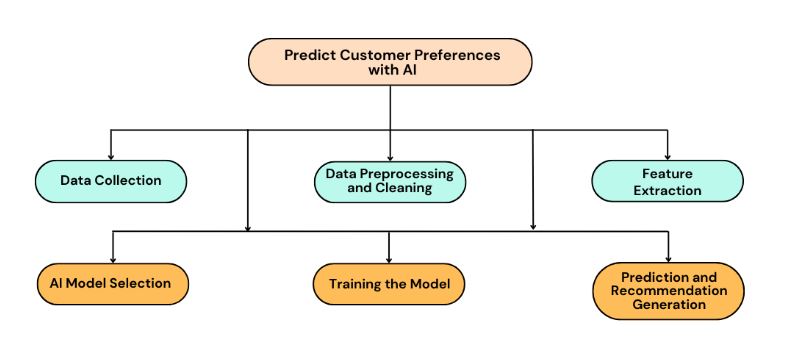Retrieval Augmented Generation (RAG) with LLM-Powered Search: Smarter AI Answers


One of the most important factors for success in eCommerce is an understanding of customer preferences and what the customer truly wants. Modern-day shoppers expect experiences to serve their needs. Business has to adapt itself to meet these expectations. AI is something that helps companies analyze customer data, identify specific patterns, or predict future behavior based on customer preferences. This article discusses how AI predicts customer preferences, the techniques it employs, and the practical benefits that deliver to eCommerce businesses.
AI has emerged as a very significant tool to understand the needs of consumers with more than ever accuracy. The earlier approaches were based on manual processing of data and were limited in terms of datasets.
AI, however, has been able to process large-scale eCommerce customer data analysis with AI, aggregated from various sources, including browsing history, purchase behavior, reviews, and social media engagements. By using machine learning algorithms, eCommerce platforms can gain insights into customer preferences and predict future buying behavior.
A recent SurveyMonkey post provided some interesting information on customer involvement preferences based on a study of over 2000 respondents.
This is what they reported:
AI for predicting customer preferences in eCommerce relies on several advanced techniques. Some of the most widely used methods include:
ML algorithms analyze historical customer data to identify patterns and predict future behavior. These models can segment customers based on shared characteristics, enabling highly targeted marketing strategies.
NLP analyzes text data, such as customer reviews and social media comments, to understand sentiment and preferences. For example, analyzing product reviews can reveal features customers value most.
This technique suggests products based on activity and preferences of users who make or show similar behavior. Collaborative filtering forms the heart of most recommendation systems.
Predictive Analytics is statistics-based learning and machine learning combined to produce the forecast of behavior, including return and churn.
This could be deep learning models, such as neural networks, that can process unstructured data, like images and videos. AI can assess how their customers engage with visual content to better understand their aesthetic preference.
AI-powered customer insights in eCommerce extend across multiple touchpoints, transforming how businesses operate.
AI suggests products tailored to individual preferences, increasing the likelihood of conversions. Platforms like Amazon and Netflix excel in this area by analyzing user activity in real time.
AI predicts customer behavior and helps businesses design the most targeted marketing campaigns. For example, AI can identify how likely a customer is to react to discounts or specific promotions.
Demand forecasting by AI ensures that the most selling is on the shelf and less in-demand products are not overstocked.
AI-powered chatbots use shopping guidance by replying to some queries and making product recommendations based on certain preferences.
AI algorithms analyze market trends and customer behavior to set optimal prices. Customers prepared to pay a premium, for example, may see somewhat higher prices, whilst price-conscious shoppers may see discounts.
Implementing AI for customer preference prediction for online stores offers numerous advantages:
By understanding customer needs with AI technology, businesses can provide smooth and high-satisfying shopping experiences that translate to a more satisfactory return.
Predictive analytics ensures what the customers will need is actually provided beforehand and thereby builds loyalty and diminishes churn.
AI compiles customer data to provide actionable insights that determine business decisions.
As technology becomes more advanced, so does AI and eCommerce. Here are a few trends that look set to follow:
AI systems will increasingly offer real-time personalization, adapting recommendations and content as customers interact with a platform.
With the rise of voice assistants like Alexa and Siri, AI will enhance voice commerce by predicting preferences through conversational data.
AI-driven AR experiences will enable customers to visualize products in real-world settings, further personalizing the shopping journey.
As AI usage grows, there will be a focus on ethical practices, such as data privacy and unbiased algorithms, ensuring customer trust.
Future AI models will analyze emotional responses to predict customer preferences more effectively, offering hyper-personalized experiences.

This chart diagram illustrates ways in which AI can be used to detect and leverage customer preferences in an ecommerce business.
For businesses to harness the full potential of AI, integration with existing platforms is crucial. Here’s how this can be achieved:
API-Based Solutions: Use APIs to connect AI tools with platforms like Shopify or WooCommerce for seamless data flow.
Scalable Cloud Solutions: Adopt cloud-based AI platforms that integrate easily with various systems.
Customization: Tailor AI models to address specific business needs, such as local market preferences or niche product segments.
Training and Support: Equip teams with training to maximize the benefits of AI integrations.
AI has changed eCommerce by making it possible for companies to accurately understand and predict customers’ needs. Applications go from such a straightforward recommendation to dynamic pricing, an important factor in redefining the industry. In fact, techniques like machine learning and NLP provide real opportunities for businesses to improve customer experiences, work more efficiently, and grow.
Integration with future-edge technologies such as AR and voice commerce promises to render online shopping more intuitive and bespoke. If willing to invest in AI, the businesses will reap rewards in building stronger customer relationships and an edge over the competition in such a thickly populated marketplace.
Long-term success can be bridged by employing AI in predicting the preferences of customers in the field of eCommerce through data-driven customer-centric strategies.
If you are wondering how AI may help your eCommerce platform, schedule a free consultation with RBM Software. Our experience offering scalable, world-class eCommerce solutions assures that your company is ready to use AI-driven technology efficiently and affordably.